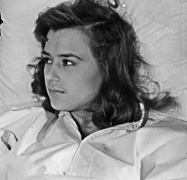Film actress
Harriet Andersson began her acting career as a 15-year-old student at Calle Flygare stage school. She joined director Ingmar Bergman for several stage productions at Malmö stadsteater between 1953 and 1956. [1] [2]
In a 2008 interview with Mick LaSalle of the San Francisco Chronicle , Andersson debunked a rumor that she was discovered by Bergman while working as an elevator operator: "In an elevator! Ha, that's a new one for me. No. I did operate an elevator, but that was when I was 14½! Ingmar did not discover me. I was discovered in 1949 in theater school. Before Monika, I had many small parts. Most of them were a little like Monika. I looked that way. I looked like a bad girl. But I wasn't a bad girl, really. I was a very nice little girl, until I found out what life was." [3]
Bergman wrote the title role in Summer with Monika (1953), specifically for Andersson. Filmed in Sweden, the motion picture shows the romantic history of two disaffected youths from first meeting to a summer idyll followed by their hasty marriage and subsequent divorce.
Although the romantic relationship with Bergman was brief, they continued to work together. Andersson appeared in several of his best-known films, including Smiles of a Summer Night (1955), Through a Glass Darkly (1961), Cries and Whispers (1972), and Fanny and Alexander (1982).
In Through A Glass Darkly, in which Andersson appeared with Max von Sydow and Gunnar Björnstrand, she portrays a latent schizophrenic. The film title is taken from a verse in First Corinthians (13:12) where Paul of Tarsus says, "For now we see through a glass darkly: But then face to face; Now I know in part; But then I shall know even as I am also known". The plot deals with the actions of four persons during a twenty-four-hour period in an old house a far distance out on the Swedish Archipelago. Some audiences were shocked by Andersson's vivid portrayal of the presence of God as represented in the dark world of a schizophrenic.
Like several other Bergman associates, she has also had a career in English-language films including performances in Sidney Lumet's The Deadly Affair (1966) and later in Lars von Trier's Dogville (2003).
Her autobiography, a set of interviews with Jan Lumholdt, was published in 2006. [4]
This page is based on this
Wikipedia article Text is available under the
CC BY-SA 4.0 license; additional terms may apply.
Images, videos and audio are available under their respective licenses.

